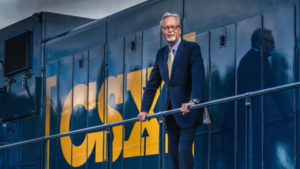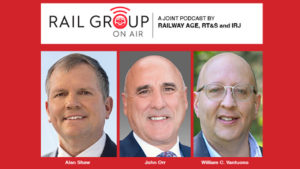FRA high-speed-rail effort draws fire
Written by jroodThe federal agency in charge of $8 billion in economic stimulus spending on high-speed-rail projects doesn't have the staff or expertise to properly oversee the money, government investigators and congressional critics say. USA Today reports that the Federal Railroad Administration, whose main job until now had been keeping freight and passenger railroads safe, awarded the high-speed-rail grants in January -- months later than planned.
The top Republican on the
House Transportation and Infrastructure Committee called the award process
"amateur hour," saying the agency didn’t consult closely enough with
elected officials and devoted too much money to projects helping increase
speeds on existing Amtrak routes. Rep. John Mica of Florida said he’s
considering subpoenaing agency records to review its decision-making process.
"I’m very concerned
that FRA’s work missed the mark, and maybe hijacked the ability of the country
to see some true high-speed rail-operations," Mica said in a telephone
interview.
The rail agency didn’t have
enough workers to review applications by states and transportation agencies,
causing delays, the Transportation Department inspector general said in a
November report. The agency brought in staff from other department offices to
help review 214 applications, the report said.
"Our evaluation of the
agency’s efforts raises significant concerns about its ability to handle these
new responsibilities," the Transportation Department investigators wrote.
In a written response to
the inspector general’s report, Deputy Transportation Secretary John Porcari
said the FRA "accomplished an enormous amount in a brief period of
time."
"Over the last few
months, the FRA has achieved goals that could have taken years in the
past," Porcari wrote.
Agency spokesman Mark
Paustenbach said the agency’s policy is to be as open as possible about its
decision-making process.
"Our biggest priority
at the moment is to finalize agreements with states so that projects can begin
and jobs can be created," Paustenbach said in an e-mail.
In 2008, Congress passed
legislation directing the FRA to develop a national high-speed-rail plan.
Before that plan was complete, however, the February 2009 stimulus law gave the
agency the job of distributing high-speed-rail money. "Usually you design
the program and then you get the money," said Stephen Van Beek of the
non-partisan Eno Transportation Foundation. "Similar to other programs in
the Recovery Act, this was a case where you got the money and you had to design
the program around it."
In budget documents, the
agency says that it added 27 workers this year and that the Obama
administration is seeking $4.5 million from Congress to add 62 more staff
positions to the agency next year, a 7% increase over the current 917
employees.
"It’s an agency which,
at its top, has some really good people," said Emil Frankel, a former top
transportation policy official in the Bush administration who is now director
of transportation policy for the Bipartisan Policy Center. "But they’ll
have to develop some additional depth."
Paustenbach said the agency
will be able to handle its workload with the additional employees and the
experts "loaned" from other agencies.
"Our dedicated FRA staff
has already been successful," Paustenbach said.
President Obama has touted
high-speed rail as a high-tech, energy-efficient transportation option. The
largest share of the $8 billion in grants awarded in January went to
California, which got $2.3 billion for a 220-mph route between Los Angeles and
San Francisco, and Florida, which got $1.3 billion to develop a 168-mph rail
corridor between Tampa and Orlando.
Most of the rest went to
smaller projects to increase speeds on Amtrak routes or plan for future
projects in 11 other rail corridors linking large cities.
Congress added $2.5 billion
more for high-speed rail to the Transportation Department’s 2010 budget, and
the White House has asked for $1 billion more next year.





